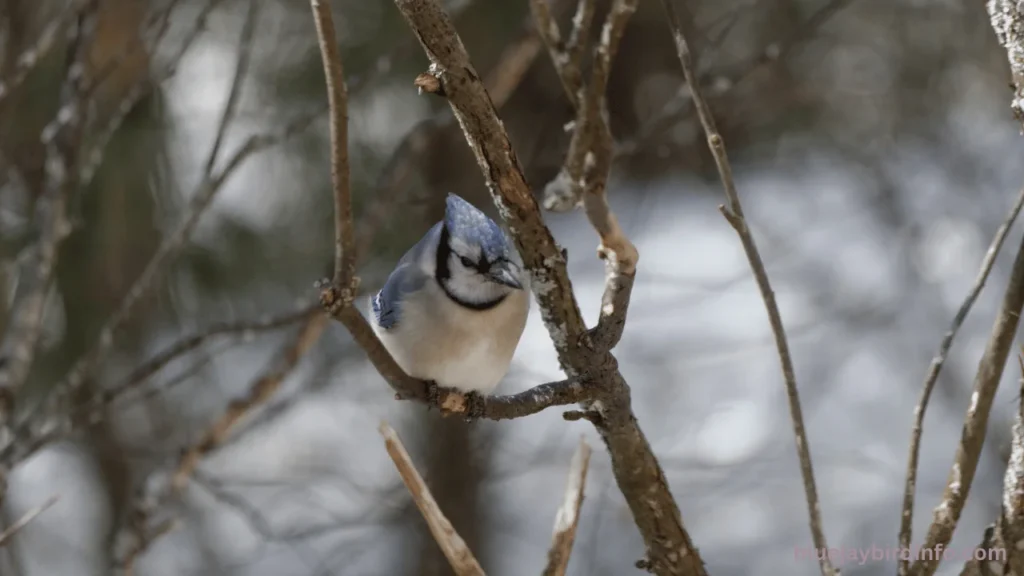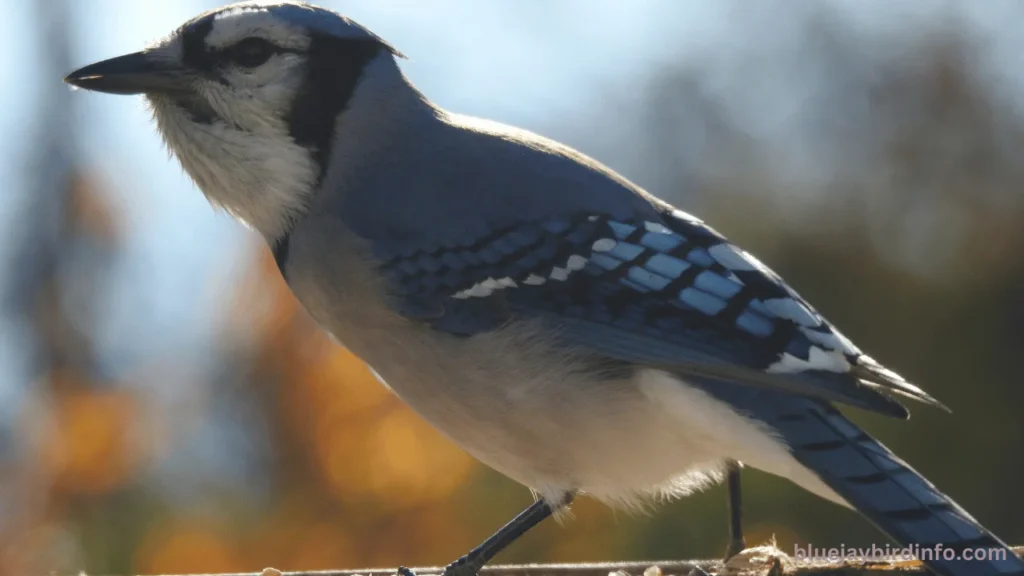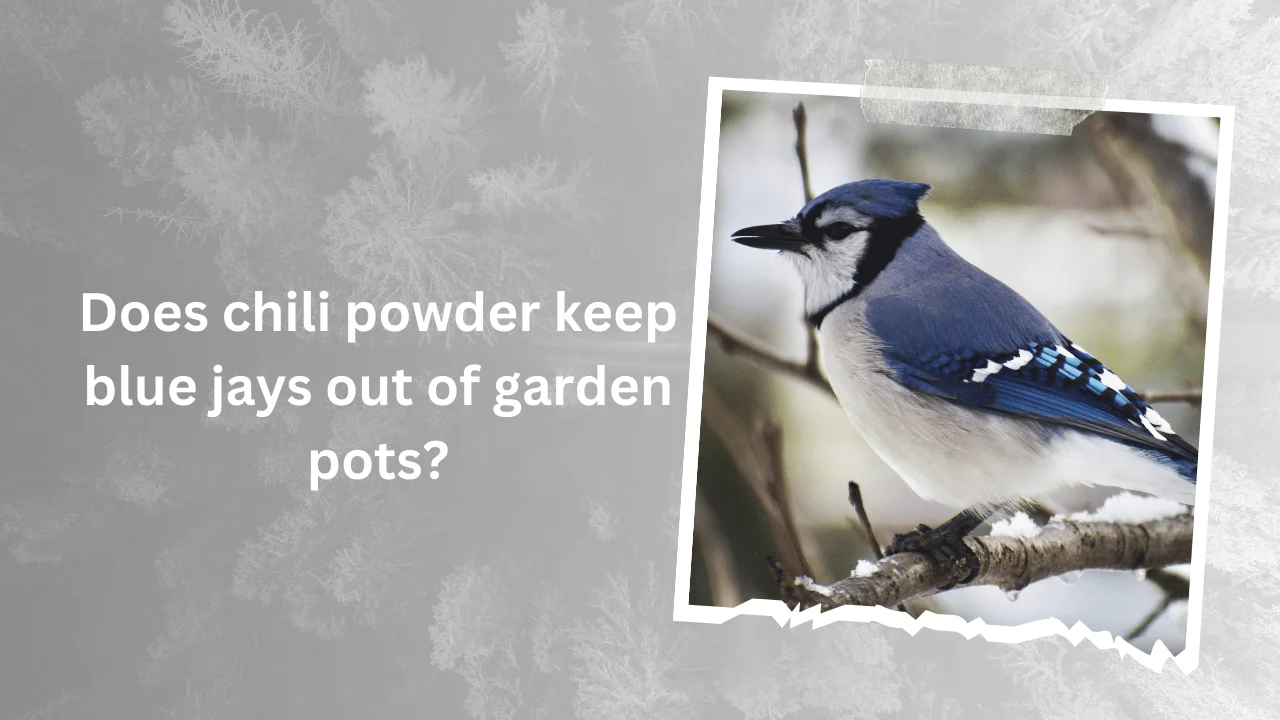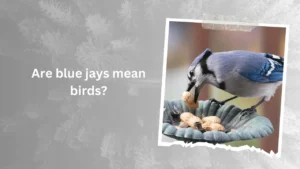Blue jays are known for their vibrant plumage and intelligent behavior, but their aggressive tendencies can turn them into unwelcome guests in your garden.
As opportunistic feeders, these birds often raid garden pots, targeting vulnerable plants and seeds. For gardeners, this can be a frustrating experience, prompting the search for effective deterrents. One natural solution that has gained attention is chili powder.
Its spicy aroma and taste make it a popular choice for keeping pests at bay, but can it really fend off these bold birds?
While chili powder is often praised for its ability to deter smaller critters, its effectiveness against blue jays remains largely undocumented.
This raises an intriguing question: does sprinkling chili powder around your garden pots actually keep these feathered intruders at a distance? In this article, we will delve into the potential of chili powder as a blue jay repellent, exploring both its advantages and limitations.
By understanding how blue jays interact with this spice, we can better protect our gardens from their determined foraging.
Before we dive into the details, it’s essential to understand the ecological role of blue jays. These birds are not just pests; they play a significant part in seed dispersal and maintaining biodiversity.
However, their penchant for raiding gardens can create a tug-of-war between the desire to attract wildlife and the need to protect our plants.
With this backdrop in mind, we’ll examine whether chili powder is a viable option for keeping blue jays out of your garden pots, along with any potential risks or benefits that may come with this approach.
Contents
- 1 Blue Jays and Garden Pests
- 2 Properties of Chili Powder
- 3 Experimental Studies
- 4 Effectiveness of Chili Powder
- 5 Alternatives to Chili Powder
- 6 Conclusion
- 7 FAQ’s
- 7.1 Does chili powder effectively deter blue jays?
- 7.2 What other methods can I use to keep blue jays away from my garden?
- 7.3 Is it safe for other wildlife to use chili powder in my garden?
- 7.4 How does bird netting work to protect my plants?
- 7.5 What are the ethical considerations when deterring blue jays?
- 7.6 Can I use multiple deterrent methods at once?
Blue Jays and Garden Pests
Blue jays can wreak havoc in gardens, causing significant damage by pecking at fruits, vegetables, and seedlings. Their sharp beaks are perfectly designed for digging into soft produce, making them particularly skilled at stripping away the tender parts of plants.
This behavior can be especially detrimental in the early growing season when seedlings are most vulnerable and when ripe fruits are begging to be harvested. For gardeners, this aggressive foraging can lead to frustration and loss, prompting the need for effective deterrents.
However, it’s important to recognize that blue jays also offer several benefits to the garden ecosystem. As opportunistic feeders, they play a crucial role in seed dispersal, helping to spread various plant species.
Their presence can also contribute to pest control, as they eat insects and larvae, keeping harmful pest populations in check. This dual role can create a complex relationship between gardeners and these vibrant birds. While blue jays may pose challenges, they also help sustain a healthy garden environment.
Finding the right balance between protecting your garden and preserving wildlife is essential. Instead of viewing blue jays solely as pests, consider ways to coexist with them while safeguarding your plants.
Implementing strategies to deter them from specific areas, like using chili powder or other natural repellents, can help maintain the delicate harmony between enjoying the beauty of nature and protecting your hard-earned garden.
Understanding this balance allows us to appreciate the ecological value of blue jays while minimizing their impact on our gardens.
Properties of Chili Powder
Chili powder is primarily made from dried chili peppers, which contain a compound called capsaicin. This chemical is responsible for the spicy heat associated with chili peppers, and it is also what gives chili powder its deterrent properties.
Capsaicin affects the sensory receptors in mammals and birds, causing a burning sensation that many animals find unpleasant. As a result, some gardeners have turned to chili powder as a natural repellent to keep unwanted pests, including blue jays, at bay.
When sprinkled around garden pots, the spicy aroma can serve as an effective barrier against these curious birds.

However, while chili powder can deter certain animals, it’s important to consider its potential risks in the garden ecosystem. For one, excessive use of chili powder might inadvertently harm beneficial insects and pollinators that play a vital role in the garden’s health.
Insects like bees, butterflies, and ladybugs are crucial for pollination and pest control, and their exposure to spicy substances can be harmful. Furthermore, if chili powder is washed away by rain, it may wash into nearby soil and affect other wildlife unintentionally.
Incorporating chili powder into your gardening routine requires a thoughtful approach. While it may provide a protective layer against blue jays and other pests, it is essential to balance this strategy with the need to maintain a thriving ecosystem.
By applying chili powder judiciously and considering alternative solutions, you can help safeguard your plants while ensuring that beneficial wildlife continues to flourish in your garden.
Experimental Studies
To thoroughly investigate the effectiveness of chili powder as a deterrent for blue jays, a well-structured experimental design is essential. One potential approach could involve creating controlled garden plots where different concentrations of chili powder are applied.
For instance, one plot could receive a high concentration, another a moderate level, and a third a low concentration. This would allow researchers to analyze whether the intensity of the chili powder impacts blue jay behavior.
Additionally, varying application methods, such as direct sprinkling on soil versus mixing into compost, could provide insights into the most effective way to utilize chili powder as a deterrent.
Another important factor to consider is the specific type of chili powder used. Different chili varieties have varying levels of capsaicin, which could affect their deterrent effectiveness.
Incorporating multiple types of chili powder in the experimental design would yield comprehensive data on which formulations are most effective in keeping blue jays away.
However, conducting such studies comes with its own set of ethical considerations and challenges. Researchers must ensure that the well-being of the blue jays and other wildlife is prioritized, avoiding harm while testing deterrents.
This includes monitoring for any unintended consequences, such as negative impacts on other bird species or beneficial insects. Moreover, long-term studies may be needed to fully understand the effects of repeated exposure to chili powder on both the blue jays and the broader ecosystem.
Balancing scientific inquiry with ethical responsibility is crucial in ensuring that these experiments contribute positively to wildlife management and conservation efforts.
Effectiveness of Chili Powder
The effectiveness of chili powder as a deterrent for blue jays has been a topic of interest for both gardeners and researchers. While specific scientific studies on this subject are limited, anecdotal evidence suggests that many gardeners have found success in using chili powder to keep blue jays at bay.
Reports from home gardeners often indicate that the spicy aroma of chili powder can effectively discourage these birds from pecking at fruits, vegetables, and seedlings, particularly when applied consistently. However, the actual impact can vary widely based on several factors.
One crucial factor influencing the effectiveness of chili powder is the sensitivity of blue jays to capsaicin, the active compound in chili peppers responsible for their heat. While many mammals are deterred by spicy substances, birds, including blue jays, have a different sensitivity to capsaicin.
This difference can make them less affected by chili powder compared to other animals, potentially diminishing its deterrent effect. Additionally, the availability of alternative food sources plays a significant role. If blue jays have easy access to other food options nearby, they may be less inclined to avoid garden areas treated with chili powder.
Therefore, while chili powder may show promise as a natural repellent, its overall effectiveness can be inconsistent. Gardeners might consider combining chili powder with other deterrent strategies, such as using scare tactics or physical barriers, to create a more comprehensive approach to protecting their gardens.
Understanding the nuances of blue jay behavior and environmental influences can help gardeners make informed decisions about how best to use chili powder in their efforts to deter these vibrant yet sometimes troublesome birds.
Alternatives to Chili Powder
When it comes to deterring blue jays from your garden, there are several alternatives to chili powder that gardeners can consider.
One effective method is the use of bird netting, which creates a physical barrier that prevents blue jays from accessing plants, fruits, and vegetables. Bird netting is a humane solution, as it keeps the birds at bay without causing them harm.
However, it requires proper installation and maintenance to ensure that it does not entrap other wildlife or affect the overall aesthetic of the garden.
Another popular option is the implementation of scarecrows or other visual deterrents, such as reflective tape or plastic owls. These methods rely on psychological deterrents to frighten birds away. While they can be effective, their success may diminish over time as birds become accustomed to their presence.
Additionally, the use of sonic repellents, which emit sounds that are irritating to birds, is gaining popularity. These devices can help keep blue jays away, but they might also disturb other wildlife and even affect the tranquility of your garden space.
When exploring these alternative methods, it’s essential to consider the ethical implications of each approach. While deterring blue jays can protect your garden, it’s important to ensure that these methods do not inadvertently harm or disrupt other wildlife species.
Striking a balance between protecting your garden and preserving the local ecosystem is vital. Ultimately, using a combination of deterrent strategies may offer the best solution, allowing you to maintain a thriving garden while respecting the natural behaviors of the birds in your environment.

Conclusion
In conclusion, this article has explored various aspects of using chili powder and other methods to deter blue jays from your garden. We reviewed the potential effectiveness of chili powder, considering factors like blue jays’ sensitivity to capsaicin and the availability of alternative food sources.
Additionally, we examined various alternatives, including bird netting, scarecrows, and sonic repellents, each with its benefits and drawbacks. Through this exploration, it is evident that while there are numerous strategies to protect your garden from blue jays, the approach must be carefully considered to ensure that it aligns with the needs of the ecosystem.
As we reflect on the balance between human needs and wildlife, it is crucial to recognize the role that blue jays play in the environment. They contribute to seed dispersal and pest control, which can enhance the health of our gardens and natural spaces.
Thus, finding humane and effective ways to coexist with these vibrant birds is essential for fostering a healthy ecosystem.
We encourage readers to experiment with different methods to deter blue jays from their gardens while always considering the ethical implications and potential consequences for wildlife.
Whether through natural deterrents like chili powder or physical barriers, being mindful of the impact on all creatures is vital for sustainable gardening practices. By adopting a thoughtful approach, we can create beautiful gardens that benefit both our needs and the natural world.
Also, read other articles related to Blue Jay Habits!
FAQ’s
Does chili powder effectively deter blue jays?
While some gardeners report success using chili powder, its effectiveness can vary based on factors like blue jays’ sensitivity to capsaicin and food availability.
What other methods can I use to keep blue jays away from my garden?
Alternatives include bird netting, scarecrows, and sonic repellents, each with its own benefits and limitations.
Is it safe for other wildlife to use chili powder in my garden?
While chili powder is generally safe for many animals, it’s essential to monitor for any unintended effects on beneficial insects and other wildlife.
How does bird netting work to protect my plants?
Bird netting acts as a physical barrier, preventing blue jays and other birds from accessing your fruits and vegetables.
What are the ethical considerations when deterring blue jays?
It’s crucial to ensure that deterrent methods do not harm blue jays or disrupt the local ecosystem while effectively protecting your garden.
Can I use multiple deterrent methods at once?
Yes, using a combination of methods can enhance your chances of success in keeping blue jays away from your garden.








